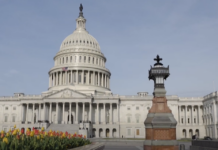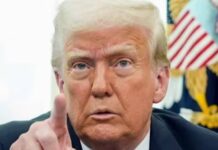
The United States can’t let their guard down for even a second. Adversaries all over the world are trying to harm us.
And the Pentagon is smashing the panic button after discovering a major threat from foreign spies.
Rising Threat of Espionage in U.S. Government Labs
American government laboratories are increasingly vulnerable to espionage from foreign adversaries, former Energy Department and national security officials warned lawmakers on Thursday. They pointed to growing concerns, particularly regarding Chinese researchers collaborating on “nuclear weapons work” with their U.S. counterparts.
Testifying before the Senate Energy and Natural Resources Committee, two former Department of Energy (DOE) undersecretaries for science and a former U.S. counterintelligence officer raised alarms about scientific espionage siphoning American innovations to develop advanced weaponry and technology abroad.
“China puts tremendous pressure in appropriating this innovation and then manufacturing it,” said Paul Dabbar, who served as energy undersecretary for science during the first Trump administration. He referred to intellectual property theft occurring within the DOE’s 17 national laboratories.
According to Dabbar, researchers acting on behalf of Beijing have stolen advancements in battery technology, electric vehicles, and semiconductors, with efforts even extending to emerging fields such as quantum computing and nuclear fusion.
Anna Puglisi, a fellow at the Hoover Institution and a former national counterintelligence officer for East Asia, echoed these concerns. “It’s a lot of the technologies of the future — it’s AI, it’s biotech,” she testified, highlighting the extensive scope of the threat.
Geraldine Richmond, who succeeded Dabbar as undersecretary for science, reflected on how espionage threats have evolved. “In these 50 years, I have seen dramatic changes in how we interact with countries of concern like China,” she stated. Having served on the National Science Board under both Presidents Trump and Biden, Richmond noted that the risks to U.S. scientific leadership have only intensified.
Dabbar further revealed an “astounding” case of “joint nuclear weapons work” between American and Chinese researchers, despite past federal investigations into Beijing’s talent recruitment programs. These initiatives, such as the Thousand Talents Program, have sought to transfer U.S. scientific advancements to China.
Additional probes have uncovered direct research collaborations between American and Chinese universities connected to the People’s Liberation Army. Puglisi emphasized that while many U.S. scientists may not suspect their colleagues of espionage, the evidence is well-documented. “No one wants to believe that their collaborator is stealing their technology, or the student that they’re supporting is doing that,” she said.
The issue has raised bipartisan concerns in Congress. Sen. Dave McCormick (R-Pa.) criticized the status quo, describing it as the U.S. “essentially paying for the [research and development] that China steals to beat us in the market.”
Weak security protocols and gaps in academic collaboration policies have allowed banned researchers to reappear at other national labs, exploiting loopholes in the system. Committee Chairman Mike Lee (R-Utah) did not mince words: “Beijing is actively exploiting weak security protocols, academic collaboration loopholes, and US grant programs to advance its military capabilities — all on American taxpayers’ dime.”
Legislative efforts to address the problem have met resistance. Sen. Tom Cotton (R-Ark.), who serves on both the energy and intelligence committees, cited bipartisan legislation that unanimously passed the intelligence panel last year but was never brought to a full Senate vote. The bill aimed to prohibit researchers from China, Russia, Iran, and other adversarial nations from working in U.S. laboratories, though similar restrictions would not apply to American scientists abroad.
“There’s zero reciprocity on this issue,” Cotton argued, pledging to reintroduce the measure in the next Congress. He also revealed that in fiscal year 2024 alone, at least 8,000 Chinese and Russian scientists had accessed DOE labs, accounting for roughly one-fifth of all foreign visitors to the facilities.
Senate Foreign Relations Committee Chairman James Risch (R-Idaho) emphasized the fundamental asymmetry in research exchanges. “I have never met a person who has set foot in a Chinese lab,” he remarked, adding that researchers from authoritarian regimes ultimately answer to their governments.
While Republicans and Democrats largely agreed on the seriousness of the issue, opinions diverged on potential solutions. Sen. Angus King (I-Maine) questioned whether an outright ban on foreign researchers would hinder scientific progress. “If there’s a total ban, is that a good policy, or would that cost us good scientific breakthroughs?” he asked.
Richmond pointed out that foreign-born researchers constitute a significant portion of the U.S. scientific workforce. “The U.S. enterprise would not function without foreign-born scientists and engineers,” she explained, “but we also cannot afford to have things stolen from us.”
As a potential compromise, Dabbar suggested implementing a waiver system allowing researchers from adversarial nations to work in DOE labs only after undergoing thorough screening.
The Department of Energy has historically been intertwined with U.S. national security, dating back to its origins in the Manhattan Project. Given this legacy, Sen. Martin Heinrich (D-NM) emphasized the importance of vigilance: “Counterintelligence at our labs is a matter that I believe we all should take very seriously. We don’t want to give our adversaries a blueprint of any vulnerabilities.”
Stay tuned to The Federalist Wire.


















